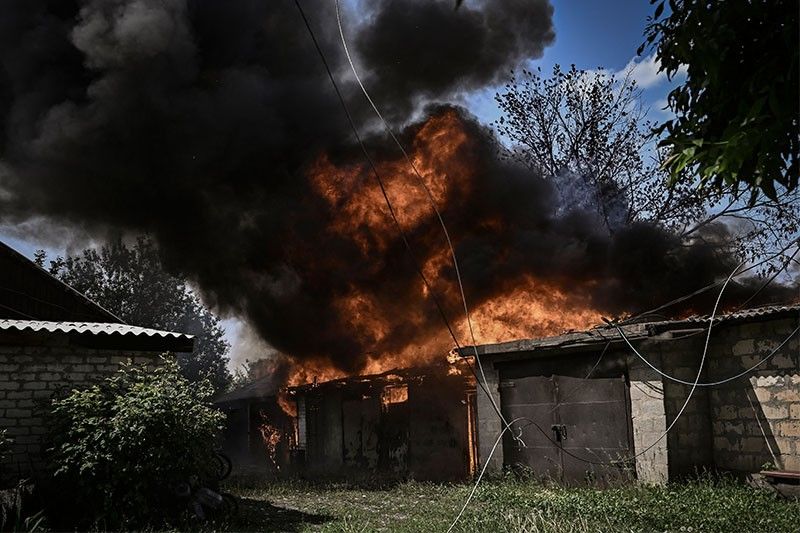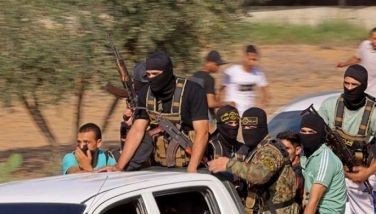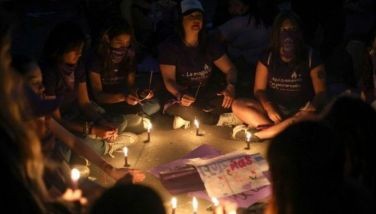War enters 100th day with Russia controlling 'fifth of Ukraine'

SOLEDAR, Ukraine — Ukraine marked 100 days since Moscow's invasion on Friday with Russian forces hammering the Donbas in their push to capture the country's east.
The somber milestone came less than 24 hours after Kyiv announced Moscow was now in control of 20 percent of Ukrainian territory, including Crimea and parts of the Donbas seized in 2014.
After being repelled from around the capital, President Vladimir Putin's troops have set their sights on capturing eastern Ukraine, prompting dire warnings the war could drag on.
Following White House talks with US President Joe Biden, NATO chief Jens Stoltenberg warned Thursday that Ukraine's allies needed to brace for a gruelling "war of attrition".
"We just have to be prepared for the long haul," Stoltenberg said, while reiterating that NATO does not want direct confrontation with Russia.
While the advance has been much slower than Moscow expected, Russian forces have expanded control beyond the 43,000 square kilometres (16,600 square miles).
"Today, about 20 percent of our territory is under the control of the occupiers," Ukrainian President Volodymyr Zelensky said in an address to Luxembourg lawmakers.
Since Russia's February 24 invasion, thousands of people have been killed and millions forced to flee, with Ukraine's east now bearing the brunt of Russia's assault, which Zelensky said was killing up to 100 Ukrainian soldiers every day.
On the ground, street battles were raging in the industrial hub of Severodonetsk in Lugansk, part of the Donbas.
The strategic city is a key target for Moscow, which already controls 80 percent of the area, but Lugansk regional governor Sergiy Gaiday vowed Ukrainian forces would fight "until the end".
Severodonetsk's Azot factory, one of Europe's biggest chemical plants, was targeted by Russian soldiers who fired on one of its administrative buildings and a warehouse where methanol was stored.
'Shooting is everywhere'
Ukrainian troops were still holding an industrial zone, Gaiday said, a situation reminiscent of Mariupol, where a huge steel works was the southeastern port city's last holdout until Ukrainian troops finally surrendered in late May.
In the city of Sloviansk, about 80 kilometres (50 miles) from Severodonetsk, residents recounted constant bombardments by Russian troops.
Paramedic Ekaterina Perednenko, 24, said she had only just returned to the city five days ago but realises that she will have to leave again.
"It's very difficult here. Shooting is everywhere, it's scary. No water, electricity or gas," she said.
Retiree Leonid, 79, said he was also leaving the city and would seek refuge elsewhere in Europe.
"I feel pain. The most prominent feeling I have is that we didn't deserve this. We don't understand why we are punished like this," he said.
Valeriy Zaluzhnyi, the commander in chief of Ukraine's armed forces, pleaded for modern armaments from NATO, saying that "the enemy has a decisive advantage in artillery."
"It will save the lives of our people," he added.
Financial squeeze
Led by the United States, Western nations have pumped arms and military supplies into Ukraine to help it survive the onslaught so far.
Bridget Brink, the new US ambassador to Kyiv, promised Thursday that the United States would "help Ukraine prevail against Russian aggression," after presenting her credentials to Zelensky.
Earlier this week, the United States announced that it was sending more advanced, Himar multiple rocket launch systems to Ukraine.
The mobile units can simultaneously fire multiple precision-guided munitions up to 80 kilometres away.
They are the centrepiece of a $700 million package that includes air-surveillance radar, more Javelin short-range anti-tank missiles, artillery ammunition, helicopters, vehicles and spare parts.
Kremlin spokesman Dmitry Peskov accused Washington of "adding fuel to the fire," although US officials insist Ukraine has promised not to use them to strike inside Russia.
Beyond sending arms to Ukraine, Western allies have also sought to choke off Russia's financial lifeline in a bid to get Putin to change course.
Ramping up an already long list of embargoes, the United States blacklisted Putin's money manager and a Monaco company that provides luxury yachts to Moscow's elite.
Across the Atlantic, EU nations agreed new sanctions that would halt 90 percent of Russian oil imports to the bloc by the end of the year.
Hunger crisis
Russia warned that European consumers would be the first to pay the price for the partial oil embargo.
But some relief was in view for the overheated oil market as producers including Saudi Arabia agreed to add 648,000 barrels per day to the market in July, up from 432,000.
The war has wrecked Ukraine's economy, forcing the central bank to more than double its key interest rate on Thursday to prop up the hryvnia.
But it carries far wider consequences too, with risks that it could trigger a global food crisis.
Ukraine — one of the world's largest grain producers — will likely export only half the amount it did in the previous season, the Ukrainian Grain Association said.
The conflict was already translating into higher costs for essentials from cereals to sunflower oil to maize, with the poorest among the hardest hit.
The head of the African Union, Senegalese President Macky Sall, is to visit Russia on Friday for talks with Putin.
The visit is aimed at "freeing up stocks of cereals and fertilisers, the blockage of which particularly affects African countries", along with easing the Ukraine conflict, Sall's office said.
President Volodymyr Zelensky on Saturday secured Turkey's crucial backing for Ukraine's NATO aspirations after winning a US pledge for cluster munitions that could inflict massive damage on Russian forces on the battlefield.
Washington's decision to deliver the controversial weapons — banned across a large part of the world but not in Russia or Ukraine — dramatically ups the stakes in the war, which entered its 500th day Saturday.
Zelensky has been travelling across Europe trying to secure bigger and better weapons for his outmatched army, which has launched a long-awaited counteroffensive that is progressing less swiftly than Ukraine's allies had hoped. — AFP
Washington's decision to supply Ukraine with ATACMS long-range missiles is "a grave mistake", Russian ambassador to the United States Anatoly Antonov says Wednesday.
"The White House's decision to send long-range missiles to Ukrainians is a grave mistake. The consequences of this step, which was deliberately hidden from the public, will be of the most serious nature," he says in a statement. — AFP
President Vladimir Putin says Sunday that Russian forces had made gains in their Ukraine offensive including in Avdiivka, a symbolic industrial hub.
"Our troops are improving their position in almost all of this area, which is quite vast," he says in an interview on Russian television, an extract of which was posted on social media on Sunday. "This concerns the areas of Kupiansk, Zaporizhia and Avdiivka." — AFP
The regional governor says debris from a drone destroyed over the Russian region of Belgorod, which borders Ukraine, fell on homes and killed three people, including a young child.
The air defense system "shot down an aircraft-type UAV (unmanned aerial vehicle) approaching the city", says Governor Vyacheslav Gladkov, adding that the falling debris destroyed several homes.
"Most importantly, three people were killed, one of them a small child," he writes on the Telegram messaging app, accompanied by pictures of a house reduced to a pile of rubble behind red and white police tape. — AFP
Ukraine's air force says on Tuesday that it had destroyed 27 of 36 Russian attack drones overnight in the south of the country.
Ukrainian forces downed 27 "Shahed-136/131" drones in the southern Kherson, Mykolaiv and Odesa regions, the air force said on the messaging platform Telegram.
In all, Moscow had launched 36 of the Iranian-made drones from the Crimean peninsula, which Moscow annexed in 2014, it says. — AFP
The Kremlin claims on Friday Russian forces never targeted civilian infrastructure after Ukraine blamed Moscow for a missile attack that killed over 50 people in the eastern village of Groza.
"We repeat that the Russian military does not strike civilian targets. Strikes are carried out on military targets, on places where military personnel are concentrated," Kremlin spokesman Dmitry Peskov says in his daily briefing. — AFP
- Latest
- Trending
































